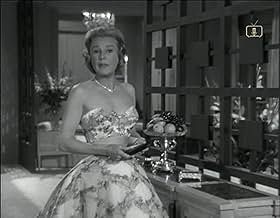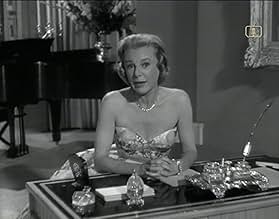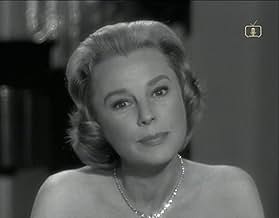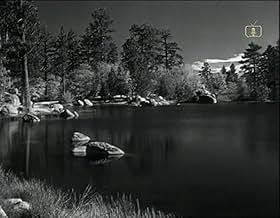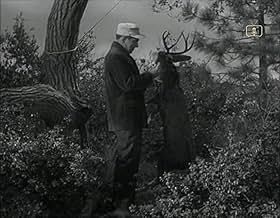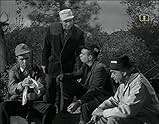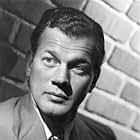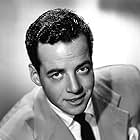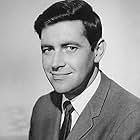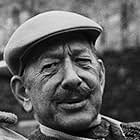VALUTAZIONE IMDb
7,4/10
249
LA TUA VALUTAZIONE
Aggiungi una trama nella tua linguaA drama anthology series presented by, and occasionally starring, June Allyson.A drama anthology series presented by, and occasionally starring, June Allyson.A drama anthology series presented by, and occasionally starring, June Allyson.
- Premi
- 1 vittoria e 1 candidatura
Sfoglia gli episodi
Trama
Lo sapevi?
- QuizThis was an anthology show, a format very popular in television's first decade and the equivalent of today's TV movies. Most were hosted by men, and June Allyson was only the third woman to host an anthology series. The others were Letter to Loretta (1953) (aka "The Loretta Young Show") hosted by Loretta Young and Jane Wyman Presents The Fireside Theatre (1955).
- ConnessioniFeatured in The Unknown Marx Brothers (1993)
Recensione in evidenza
'The DuPont Show with June Allyson' (formerly 'The DuPont Show of the Month', WITHOUT June Allyson) was an anthology series hosted by former movie ingenue June Allyson, who introduced each episode's dramatic or (occasionally) comedic story, and sometimes also took an acting role in the story itself. The format was similar to that of the much better 'The Loretta Young Show', but Allyson lacked Loretta Young's glamorous image. June Allyson's most successful on screen image was that of a girlish virgin who managed to be slightly cynical: by 1959, she was a bit too old for such parts but had gone on to nothing more promising: mostly playing the loyal wife on the sidelines in dramas about a male protagonist.
The best episode of this anthology series was 'Silent Panic', which aired on 22 December 1960: a taut suspense story with a Christmastime setting, starring Harpo Marx in a dramatic role! Harpo had the most varied career of all the Marx Brothers: for instance, Harpo was the first Marx brother to speak on the radio (yes, Harpo spoke on the radio), way back in 1926 for a news broadcast with Admiral Byrd.
First, some background on this story: in the days of cheap labour, it was fairly common for department stores to hire some poor schlub to perform as a 'mechanical man'. For an insultingly small wage, some bloke would stand in a shop window for hours at a time (no bathroom breaks?) and perform some repetitious action such as walking back and forth, moving stiffly as if he were a robot ... usually wearing gloves and face paint as well as a ridiculous costume, so that his human features were not immediately evident. When this act was done properly, a crowd would gather outside the window, trying to catch out the 'robot' if his mechanical routine revealed some imperfection that would expose the mechanical man as an actual human. You can see an example of this 'mechanical man' routine in the 1943 movie 'The Human Comedy'. In that movie, Mister Mechano must continue his 'robot' act in the shop window late at night, even after the shop is closed ... a situation which also prevails for Harpo's character in 'Silent Panic'.
Now, back to Harpo. In 'Silent Panic', Harpo Marx plays a genuine deaf-mute... as opposed to his usual role as a man who chooses not to speak. Because of his handicap and his advanced age, Benson (Harpo's character) is impoverished and has trouble holding a steady job. For the Christmas season, a local department store engages Benson to perform in the front window as a mechanical man. Harpo spends most of this drama in costume and make-up for his 'mechanical' turn, and he looks truly bizarre: blacked-out eyes, whitened face, scarecrow clothing. Harpo was genuinely gaunt at this point in his life: in his 'mechano' get-up he looks like a character in a horror movie. This story is NOT a comedy.
All goes well enough until one night, after closing hours: the store is shut, but Benson must continue his mechanical turn in the front window. A dark car drives into the car park, full of gangsters. They've just killed a man, and now they need to dump the corpse someplace where there are no witnesses. One of the gangsters spots Benson in the shop window: is he a witness? The gangsters watch the stiff movements of the 'mechanical man' and decide he's just a robot. The camera shows us Harpo's face in close-up as he realises his predicament: in order to avoid getting rubbed out, he's got to convince these men that he's really a mechanical man! He manages to continue his imposture, and the gangsters leave.
But then they find out that he's a live man after all ... which means he's going to be a dead man soon. The gangsters don't realise that Benson is an imperfect witness at best: as a deaf-mute, he didn't hear anything and he can't say anything. Ernest Truex (an actor whom I usually dislike) is excellent here as the elderly security guard at the department store, to whom Benson goes for help. Gradually, the authorities realise that Benson has witnessed some sort of crime, but they can't figure out WHAT. (There's some expository dialogue about Benson never having gone to school as a child, so he can't write down what he witnessed.)
'Silent Panic' is expertly paced by Arthur Hiller. The photography is effective, capturing the cheesy atmosphere of the downmarket department store. The Christmas setting and the dodgy commercialism make an excellent contrast with the murder and mayhem of this plot line, and the gangsters' thick-ear dialogue. The ending is only slightly a letdown from the suspenseful pacing which precedes it. Most of all, Harpo's bravura acting is a revelation: he is genuinely convincing as a man who is unable to hear and unable to speak. He conveys a wide range of emotions splendidly in this low-budget drama. If all the episodes of this anthology series had been as good as this one, 'The DuPont Show' would be a classic of television's golden age.
The best episode of this anthology series was 'Silent Panic', which aired on 22 December 1960: a taut suspense story with a Christmastime setting, starring Harpo Marx in a dramatic role! Harpo had the most varied career of all the Marx Brothers: for instance, Harpo was the first Marx brother to speak on the radio (yes, Harpo spoke on the radio), way back in 1926 for a news broadcast with Admiral Byrd.
First, some background on this story: in the days of cheap labour, it was fairly common for department stores to hire some poor schlub to perform as a 'mechanical man'. For an insultingly small wage, some bloke would stand in a shop window for hours at a time (no bathroom breaks?) and perform some repetitious action such as walking back and forth, moving stiffly as if he were a robot ... usually wearing gloves and face paint as well as a ridiculous costume, so that his human features were not immediately evident. When this act was done properly, a crowd would gather outside the window, trying to catch out the 'robot' if his mechanical routine revealed some imperfection that would expose the mechanical man as an actual human. You can see an example of this 'mechanical man' routine in the 1943 movie 'The Human Comedy'. In that movie, Mister Mechano must continue his 'robot' act in the shop window late at night, even after the shop is closed ... a situation which also prevails for Harpo's character in 'Silent Panic'.
Now, back to Harpo. In 'Silent Panic', Harpo Marx plays a genuine deaf-mute... as opposed to his usual role as a man who chooses not to speak. Because of his handicap and his advanced age, Benson (Harpo's character) is impoverished and has trouble holding a steady job. For the Christmas season, a local department store engages Benson to perform in the front window as a mechanical man. Harpo spends most of this drama in costume and make-up for his 'mechanical' turn, and he looks truly bizarre: blacked-out eyes, whitened face, scarecrow clothing. Harpo was genuinely gaunt at this point in his life: in his 'mechano' get-up he looks like a character in a horror movie. This story is NOT a comedy.
All goes well enough until one night, after closing hours: the store is shut, but Benson must continue his mechanical turn in the front window. A dark car drives into the car park, full of gangsters. They've just killed a man, and now they need to dump the corpse someplace where there are no witnesses. One of the gangsters spots Benson in the shop window: is he a witness? The gangsters watch the stiff movements of the 'mechanical man' and decide he's just a robot. The camera shows us Harpo's face in close-up as he realises his predicament: in order to avoid getting rubbed out, he's got to convince these men that he's really a mechanical man! He manages to continue his imposture, and the gangsters leave.
But then they find out that he's a live man after all ... which means he's going to be a dead man soon. The gangsters don't realise that Benson is an imperfect witness at best: as a deaf-mute, he didn't hear anything and he can't say anything. Ernest Truex (an actor whom I usually dislike) is excellent here as the elderly security guard at the department store, to whom Benson goes for help. Gradually, the authorities realise that Benson has witnessed some sort of crime, but they can't figure out WHAT. (There's some expository dialogue about Benson never having gone to school as a child, so he can't write down what he witnessed.)
'Silent Panic' is expertly paced by Arthur Hiller. The photography is effective, capturing the cheesy atmosphere of the downmarket department store. The Christmas setting and the dodgy commercialism make an excellent contrast with the murder and mayhem of this plot line, and the gangsters' thick-ear dialogue. The ending is only slightly a letdown from the suspenseful pacing which precedes it. Most of all, Harpo's bravura acting is a revelation: he is genuinely convincing as a man who is unable to hear and unable to speak. He conveys a wide range of emotions splendidly in this low-budget drama. If all the episodes of this anthology series had been as good as this one, 'The DuPont Show' would be a classic of television's golden age.
- F Gwynplaine MacIntyre
- 28 mar 2003
- Permalink
I più visti
Accedi per valutare e creare un elenco di titoli salvati per ottenere consigli personalizzati
Dettagli
- Data di uscita
- Paese di origine
- Lingua
- Celebre anche come
- The DuPont Show with June Allyson
- Luoghi delle riprese
- Aziende produttrici
- Vedi altri crediti dell’azienda su IMDbPro
- Tempo di esecuzione30 minuti
- Colore
- Proporzioni
- 1.33 : 1
Contribuisci a questa pagina
Suggerisci una modifica o aggiungi i contenuti mancanti

Divario superiore
By what name was June Allyson Show (1959) officially released in Canada in English?
Rispondi
